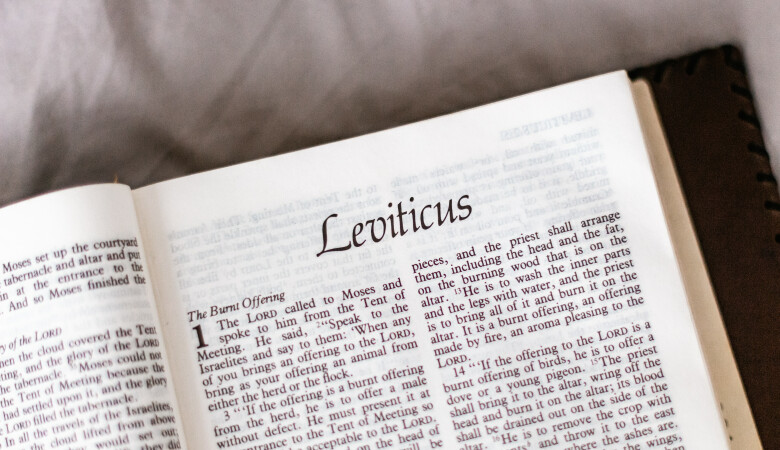The Church's Vigilance Over One Another (Hebrews Sermon 11 of 74)
November 28, 2010 | Andy Davis
Hebrews 3:12-14
Church Membership, The Power of Sin
The Isolation of Our Age
You know, I've often wondered what it would have been like to land on the beach there in Cape Cod in December of 1620. The cold weather, it kind of cuts right through you. As I think about it, I think about the remarkable isolation of that little band of pilgrims as they landed there and the fact that there was really no one to help. At least so they believed at that point, they really relied on themselves to survive. They had come from crowded Holland and crowded England and landed in just remarkable desolation. What kind of isolation they must have experienced as disease ravaged their numbers and they bore that brunt alone. They were isolated Christians.
But I tell you that in the 21st century, there's a different kind of isolation that I see that's perhaps even more troubling than that. The isolation I'm talking about is a kind of a relational or spiritual isolation, a kind of an anonymity that some 21st century Christians are seeking in their church involvement. They don't desire to know or to be known. They desire a kind of an anonymity, they want to be isolated in that one sense. And I tell you, it is devastatingly unhealthy for the Christian life. It is not what a church should be. And it can take many forms, it can happen in a small church, or a large, it's not just endemic to mega-churches, although I think it's easy there, to slip in, in a huge service and to take in what they present for you to, in some sense be entertained, in some sense challenged and blessed by the ministry of the Word of God and then to leave. And no one knows your name.
But it's not just in big churches that that kind of thing can happen. It can happen in medium-sized churches and small churches as well. The bottom line is, we're only going to know and be known as much as we choose to be. And so what I want to do this morning, is kind of persuade you to choose to be. Kind of persuade you to choose to know and be known and be part of the local church. Now, I said last week, Hebrews 3:7-8 are the most important verses that I know in terms of my own personal daily walk with Christ.
I think there are other verses that are incredibly important and you may have your own life verse, but for me Hebrews 3:7-8 is incredibly important in terms of my personal standing before Jesus, day-by-day, and receiving from him my... A sense of marching orders. What is it he wants me to do? Big picture in my life and then day-by-day. And so we saw that in Hebrews 3 today, as the Holy Spirit says, "Today, if you hear His voice, do not harden your hearts." And so I interpret that, first and foremost, to be the Holy Spirit speaking to me as an individual, as a child of God, through the written word of God. And then as the Spirit takes to what I've learned in Scripture, he applies it to my life and I'm transformed and I'm given my marching orders. These are incredibly important verses. But I believe the verses we're looking at today, Hebrews 3:12-14 are the most important verses in the Bible in terms of local church involvement.
And specifically in this area, of understanding one line from our church covenant. And that is this, "We will watch over one another in brotherly love." Have you ever heard those words before? Have you ever been here for 'New Member Sunday'? You know, we read our church covenant, every New Member Sunday. And those words, I don't know why, but those words stand out to me more than any of the other words. And they convict me. We will watch over one another in brotherly love, I want to talk about that today. And I believe that Hebrews 3:12-14, are the best verses in the Bible for understanding what I think those words meant to those who penned them in the church covenant.
It's not so important ultimately that we live up to a man-made covenant like that, although I think it's an excellent covenant and the promises are biblical and right, but they are rooted in Scripture, and it is incredibly vital for us to obey the verses we see before us today. So I'm going to be preaching two sermons on this one passage.
This morning, my plan is to just go carefully through in a very exegetical way, explaining each word, each phrase so that we understand Hebrews 3:12-14. And give a little bit of application at the end because we just won't have much more time. And then in two weeks, next week we have Dr. Akin and we're delighted to have him come and preach, concerning Lottie Moon; excited to have him. But two weeks from this morning, I'll resume and finish a look at Hebrews 3:12-14. And that's going to be primarily applications, in which I'm going to be seeking to take the ideas in these verses, and apply them to The First Baptist Church so that we can grow in our love for one another, okay? So this morning, it's going to be mostly an explanation of what's here and then some application, but then in a couple of weeks, we're going to look at it again.
I. The Greatest Danger: Turning Away from the Living God
And as I look at these verses, I see right away a great danger here, a danger for us in our Christian lives. Look at it in verse 12. "See to it brothers that none of you has a sinful, unbelieving heart that turns away from the living God." The danger, in a word, for us; the danger facing us in this verse, staring us in the face is the danger of apostasy. Now, you may not know what that word means, but it's really just a transliteration of the Greek word that's right here in the text. αποστασία is the verb when it talks about turning away from the living God. And from that, we get apostasy. What does it mean? Well, the word in the Greek means to stand apart or away from, or to withdraw or to absent oneself from, that's what the word means. And see, the idea here is that we are in danger of apostasizing or standing apart or away from or withdrawing from, or being absent from the living God.
It's the second in a series of verses that I've linked before, and the NIV translation comes out most plainly, all of them linked by the word "away." So, in Hebrews 2:1, it says "We must pay more careful attention, therefore, to what we have heard, so that we do not drift away." Remember that. Drifting away. Here in 3:12, "See to it brothers that none of you has a sinful, unbelieving heart that turns away from the living God." And then the third in the series is all the way in 6:6. And there it talks about the danger, the grave danger of people who have experienced rich blessings in church life, I think we'll talk about that, if they fall away to be brought back again to repentance. So basically, as you string them together, there are three warnings and they're all dealing with the same danger. Don't drift away, don't turn away, don't fall away from the living God. That's what we're dealing with here. The danger of apostasy.
The Necessity of Drawing Near
Now in the book of Hebrews, nearness to God, proximity to God, being near to God is the goal of salvation, it's what God is doing. He's bringing us near to him, but these people are going away from Him. They're going away from the living God. So, over and over, the author of Hebrews will speak of the closeness of God to us in salvation and he exhorts us to draw near to God. For example, in Hebrews 4:16, it says, "Let us then approach the throne of grace with confidence so that we may receive mercy and find grace to help us in our time of need." Isn't that beautiful? Let us approach the throne of grace. Let's draw near to God it's saying there. Again in Hebrews 7:19, it talks about the superiority of the new covenant, it says a better hope, a better covenant is introduced by which we draw near to God.
And then again in Hebrews 10:19-22 it say, "Therefore brothers, since we have confidence to enter the Most Holy Place by the blood of Jesus, by a new and living way opened for us through his curtain, that is His body, and since we have a great High Priest over the house of God, let us draw near to God with a sincere heart and full assurance of faith." This is an incredible privilege of the new covenant. The old covenant was all about thus far you may come and no further. It's all about stay away basically in the old covenant, or you're going to get killed. But here, in the new covenant, we have an opening now. We have a new and living way to come right into the very presence of God, and multiple commands in the Book of Hebrews, that we should do so. That we should draw near to God, that we should be close to the living God.
But apostasy is the exact opposite, it's to turn willingly away from the living God. To choose to live a life apart from His holy presence, to try to carve out some kind of separate existence where God is not the center. Or perhaps God is not present at all, that is apostasy. These people turn away because they don't truly believe in the living God, they don't truly love Him, they turn from God back again to idols of their own imagination. The danger here in Hebrews in my opinion, seems to be more of a drifting away from God caused by unbelief and trials and difficulties that are connected with the Christian life, more than the kind of a defiant, angry rebellion against God.
These people as we've mentioned, were Jewish professors of faith in Christ, they had made a claim to be Christians. They were interested in the Christian Gospel, interested enough to claim it as their own. To in some sense stand with Christ and be counted as a Christian, to be water baptized I believe at one point. But now they're drifting, now there's a salt in their souls and they're in danger of doing the very thing that the author is talking about here.
They might quietly assent that the facts of the gospel are still true to them, but they've found that Christian life is too difficult to live, and the allure of the world is too difficult to resist. And so, they are little by little getting further and further away from Jesus. That's what I think is happening here, for these Hebrew Christians. And so the author is bringing up this great danger of apostasy, this danger of turning away from the living God.
The Living God
And think about that expression, the living God. The living God, see to it brothers that none of you has a sinful, unbelieving heart that turns away from the living God. It's a remarkable expression. It's used 28 times in the Bible, four times here in the Book of Hebrews, more than any other book in the Bible.
So this book, the author really seems to love this expression, the living God. Scripture in general, I think uses this expression, the living God, to focus minds the minds of sinful man on the central truth of the universe. There is one and only one God, and all other gods are idols or demonic impersonators of Gods. There is only one living God. Deuteronomy 5:26, it says, "For what mortal man has ever heard the voice of the living God speaking out of fire as we have, and survived?"
The Jews at the base of Sinai, they had the sense they were in the presence of a living God. He was alive. Not mute, or absent like the gods of the nations. The gods of the nations are dead, there's no life in them. Psalm 115, "The enemies mock us," says the Jewish Psalm writer. "Where is your God?" And the Psalm writer says, "I'll tell you where our God is" "Our God is in heaven, He does whatever pleases Him." "But their idols," says the Psalmist, "are silver and gold, made by the hands of men. They have mouths, but cannot speak. Eyes, they have, but cannot see. They have ears, but cannot hear, noses, they have, but they cannot smell. They have hands but they cannot feel, feet, but they cannot walk. Nor can they utter a sound with their throats," these dead gods of the nations, their idols."
The creator of the ends of the earth, the creator of the universe is the only God and dear friends, He is alive. More than you can possibly imagine, He is alive. Whatever that means, to you, to be alive. Life is such a mystery isn't it? What makes something alive, and the thing, the rock or the other thing is dead, what makes it alive? But God is the giver of all life. "For in Him, we live and move and have our being," our existence is in Christ." In Him was life, and that life was the light of men. He is the living God. So to turn away from the living God can be nothing but death, friends, nothing but death.
The essence of life then is to be in God. And the essence of death is to be separate from God. And so the author is trying to challenge these Hebrew Christians not to turn away from the living God. And I might go a step beyond and I don't think God the Father would mind.
Context: The Focus is Christ
If we would imagine that the author to the Hebrews was focusing specifically on Christ, that these Jewish Christians were turning away from the living God as He has been revealed in Christ. They've turned away from Jesus. In Hebrews Chapter 3, the context here, the beginning verses 1-6, of Hebrews 3, the author has been comparing Jesus to Moses and said that Jesus is greater than Moses, He's worthy of greater honor than Moses, His mission is greater than Moses' mission. Moses was a servant in God's house but Jesus is a son over God's house, He's greater.
Greater than Moses. And then in Hebrews 3:7-11, he brings in the testimony of Psalm 95, and the warning of Psalm 95, as we've seen. "Today if you hear His voice, don't harden your hearts." And he's harkening back to that earlier history when the Israelites refused to enter the Promised Land through their unbelief and their disobedience, they would not enter the Promised Land and so God declared an on oath in his anger, they should never enter his rest. And so, the author is bringing this history out of Psalm 95 to give the warning to the Jews. He's going to return to the history when we're done with Hebrews 3:12-14. So the end of the Chapter 15 to the end, he's going to go back to that history, and talk about it. But here in the middle, he just stops and just gets right to the point.
And the point of all of this, is this warning against apostasy, it's what the whole book was written about. And so right in the middle, he gets to this issue of Christ, of apostasy from the living God as He has been revealed in Jesus Christ.
The Great Offer of the Gospel
Friends, this is the greatest danger of our lives. This is the greatest danger of our lives, there is nothing in the world more precious to you than your soul. What would it profit a man to gain the whole world and lose his soul, said Jesus. Or what could a man give in exchange for his soul? There's nothing more valuable to you than your soul. And it is possible for you to lose your soul, according to those verses. Jesus came into the world to save our souls, He shed His blood on the cross that we might have eternal life. I am acutely aware this is an unusual Sunday, this is the Sunday after Thanksgiving, attendance is a little bit down, some unusual faces here.
I think it's quite possible I may be speaking to some family members or friends or guests who don't know Jesus as your Lord and Savior. And you don't know for certain whether this is the last day of your life or not, you don't know how much longer you have. I'm pleading with you to turn to Christ today, while there's time. Jesus shed His blood on the cross, for sinners like you and me, that He might bring us into life that which is truly life, eternal life. The living God, a relationship with the living God, all of your sins forgiven, instantly. Now, while you sit in the pew, and listen to me, you just look to Jesus and you cry out to Jesus in your heart, and you say, "Jesus forgive me for my sins. I need You to forgive me, I ask you to forgive me, take me to heaven when I die. I want to live with you forever." And he'll do all of that, isn't that incredible?
It's the gospel. But now these Jewish people, they had heard that, they had assented to that, they had come forward and asked for baptism, they had been baptized on their profession of faith. But the initial profession of faith in Christ is not enough if it's not followed up with a life of faith-filled works by the power of the Spirit. James says it's a dead faith, it's not a genuine faith. You've got to keep running this race with endurance, and the only true faith is that which God gives in Jesus Christ, and that which God starts in us, He finishes right to the end. He opens up faith in the heart and He keeps it going until you don't need it anymore. And you know when you won't need your faith anymore? When you see Jesus with your own eyes.
So He opens up faith, He gives it to you as a gift and justifies you on that basis. What a gift, and I'm pleading with you now, hear the words of the Gospel. Jesus the Son of God died on the cross for sinners like you and me, shed His blood. Trust in Him and you'll be saved. The danger, however, is to hear, to make an outward kind of surface-y assent, to impress your friends and your neighbors, and your relatives, but it's not a genuine work of God in your heart.
And you could say, "How can I know?" Well, we'll get to that, but the issue here is at some point there's a drifting away, a turning away, a falling away. And so, the danger here is apostasy, turning away from Christ.
II. The Root Cause: Sin’s Effect on the Heart
The root cause of the apostasy is sins effect on the heart. Look at the verse again, "See to it brothers that none of you has a sinful, unbelieving heart that turns away from the living God." The apostasy then is caused by a sinful, unbelieving heart. Now, what is the heart, what do we mean by the heart?
Well, according to the scripture, the heart is the essential part of every man, and woman, boy and girl. It's the core of your being. It's the part of you that thinks, and reasons, it's the part of you that feels, it's the part of you that perceives and understands. It's the part of you that loves and hates, it's the part of you that chooses and rejects. It's the heart. Now, the gospel of Jesus Christ goes after the heart, the Gospel wants all of your heart, your whole heart.
So the Bible often speaks of a whole-hearted devotion to God. Sermon on the mount goes for the heart. You have heard that it was said, You shall not murder, but if you're angry in your heart, you've committed murder in your heart. You've heard it said, you shall not commit adultery, but if you lust after another person you've committed adultery in your heart. The heart, the core of the being, biblically is, what the Gospels going after. A heart for Jesus.
The Essence of True Religion
Now, Jonathan Edwards in his Treatise on Religious Affections he said that the essence of true religion is a heart love, or affection, for God through Jesus Christ. That's the core of it. He says that, the heart, your heart, all of our hearts, has the ability to take in information about the world around it, to see it, to perceive it to understand it, but not only that, to either be attracted to or repulsed from everything you perceive to a greater or less degree. Some things you really love, somethings you only like, some things you slightly just dislike, some things you may hate. But that's just what the heart does, that's the heart's business.
And the danger here then is of a heart that turns away from the living God is really, in some sense, now repelled from Christ, not attracted to Jesus anymore. And note the adjectives here concerning this heart, a sinful unbelieving heart. These are very strong descriptors. The essence of sin is to turn away from God, to turn away from the living God for something else, something other than the living God.
The essence of unbelief then is to not see Jesus with the eyes of the soul as the most attractive thing that there is in the universe. Nothing more appealing, nothing more beautiful. Faith sees the invisible world and especially Christ at the center of it sees the person and work of Christ as the most staggering beautiful thing imaginable, the glory that comes from the love he showed in dying for us. The cross then not any longer merely an instrument of gruesome execution, but a display of the love of God that you'll spend eternity plumbing the depths of. But to you it's attractive. When I survey the wondrous cross, when I see the beauty there and the attractiveness my eyes have been opened and I just see it as a beautiful thing now. It's attractive to me, when it could have been repulsive.
So the work of Christ, the glory of Christ in His resurrection body, what it must have been like to see Jesus in His resurrection body. That mysterious spiritual body that can never die, is not subject any longer to death, free from that, passing through walls, coming into the upper room saying, "Here I Am. Shalom, peace be with you." People shocked, stunned, able to eat broiled fish, the glory of it, the beauty of it, the attractiveness of Christ in all of what he has done, and him seated on the throne of God at the right hand of Almighty God. How attractive and how beautiful that vision is, faith alone can see this ravishing beauty. I think it's why so many hymn writers meditate on this theme of the beauty of Jesus, the beauty of Christ.
One of them is just called Beautiful Savior. Don't you love that hymn? "Beautiful savior, I long to be", says the hymn writer. "I long to be where the praise is never ending, I yearn to dwell where the glory never fades, where countless worshipers will share one song and cries of worthy will honor the lamb. Beautiful Savior, Wonderful Counselor, clothe the majesty Lord of history. You're the way, the truth, and the life, you're the star of the morning, you're glorious and holiness, you're the risen one, heaven's champion, you reign over all." There's just beauty in those words, beauty.
The hymn writer's saying I long to be there. He would gladly lay down his own hymn to see Jesus face to face. Amen. We see through a glass darkly right now. But someday we're going to see ravishing beauty, and when we see him, we will be instantaneously transformed, and made like Him. That's the power of that beatific vision of the glory, the beauty of Christ. Many other hymns talk about it, Fairest Lord Jesus, the beauty of Jesus, the radiance or Bernard of Clairvaux wrote Jesus, the very thought of Thee was sweetness fills the breast, but sweeter far thy face to see and in thy presence rest. This is the attractiveness of Jesus to the eye of faith. To the eye of faith nothing in the universe could possibly be more beautiful than Jesus, as morally perfect, as attractive as Jesus. He is the radiance of God's glory and the exact representation of His being.
The greatest thing a heart could ever see then is the beauty of Jesus and to love him. Conversely, dear friends, the worst thing a human heart can ever do is to turn away from that display of beauty unfulfilled, and seek something created to fill that emptiness inside. It is a great sin. It is an infinite sin to turn away from the living God unsatisfied.
The Hardening of Sin’s Deceitfulness
Do you not see the devastation of idolatry, do you not see it, how dangerous it is to look at all that, Jesus and all that, and say it just isn't enough for me. There's just not enough there. What happens? Well, the origin of a sinful unbelieving heart is the deceptiveness, deceptiveness of sin. It says in verse 13, that the heart can be hardened by sins' deceitfulness, sin is a great deceiver. It doesn't come and tell you the truth, it never has, it never will. In Romans 7:11, it says, "For sin, seizing the opportunity afforded by the commandment, deceived me and through the commandment put me to death."
Sin is a great deceiver, just like its originator Satan, he is a deceiver, as well. It says in Corinthians, he masquerades as an angel of light, he doesn't come, honestly, to us, he comes looking kind of beautiful, kind of attractive he puts sin in that kind of garb too. It's attractive, it's beautiful, it's alluring, it's appealing. Genesis 3:13, "The Lord God said to the woman. 'What have you done?' And the woman said, 'The serpent deceived me and I ate.'" It's deceptive, it doesn't tell us the truth, it looks appealing, it looks like there's something that you can gain from it. But in the end it leads to death, Revelation 12:9, it speaks of Satan, "The great dragon", it says, "Was thrown down that ancient serpent who is called the devil and Satan, the deceiver of the whole world." He is a deceiver, he's lying to us concerning sin.
And He uses many deceptive techniques as well. Deceptive teacher. 2 John 7 says, "Many deceivers who do not acknowledge Jesus Christ as coming in the flesh, have gone out into the world, any such person is the deceiver and the Antichrist." False teachers are deceivers. Or there are deceptive philosophies, in Colossians 2:8, it says "see to it that no one takes you captive by deceptive philosophies." They seem to be wise, they seem to lead in a wise direction, but they're deceptive. Or deceptive lusts that wage war against our souls. In Ephesians 4:22 it says, "Put off your old nature, which belongs to your former manner of life and is corrupt through deceitful lusts."
The lust is a drive and a yearning, a desire for something that is forbidden, and it's deceitful because it doesn't tell you that in the end an arrow will pierce your liver spiritually and it will kill you. It's dangerous, it's a deceptive lust. Then there's deceptive wealth or material possessions. Remember how Jesus was speaking of the different types of seed... The seed going to different types of soil and there was the thorny ground here, thorny soil, and these weeds grew up and choked out the plant making it unfruitful and Jesus said the worries of this life and the deceitfulness of wealth choke it out, making it unfruitful. Wealth can be deceptive. What is the effect of sins deceitfulness? A hardening effect on your heart. Remember we already talked about that last week.
"Today, if you hear His voice, do not harden your heart." You know what hardens your heart? Sins' deceitfulness. Sins deceitfulness hardens your heart. As we become accustomed to sin our hearts get little by little harder and harder to the gentle quiet voice of the Holy Spirit. A soft heart then is yielded submissive eager happy to obey Jesus. The opposite is a hard heart, it's resistant, it's peevish, sluggish to obey, resentful, hesitant, ultimately rebellious. Sins deceitfulness works on us over a long period of time little by little, we become desensitized, first to sins outrageous and wicked nature, then to sins great danger, then to its even presence. Don't even notice that it's even around, and would fight anyone who would come and say, this is sin.
It would be shocking. Perhaps, some of you have seen that movie Time Changers in which there's a time machine and you're brought back and an individual from I think the 1890s steps into our modern world, and is just patently shocked by what he sees. Just shocked by it. Like the proverbial boiling of the frog. Things changed little by little, incrementally, little by little, over time. You just don't know what's happening, and pretty soon you're boiled to death.
And so it is our hearts become little by little hardened by sin's deceitfulness. So to sum up, this passage is addressing a great danger. Apostasy: Apostasy is a turning away from the living God, it's caused by a sinful unbelieving heart, that the root of the sinful unbelieving heart is the deceptiveness, the deceitfulness of sin. Alright, that's the bad news.
III. The Remedy: The Vigilant Encouragement of the Church
What's the remedy? We need some remedy. Is there no balm in Gilliad? We want some medicine. It's been so dreary up to this point. Well I'm sorry if it feels dreary, it's just true. And you know it, don't you? But we need the remedy and here a remedy is given to us. I say it's not the only remedy but it's a very powerful remedy. And what is the remedy, the vigilant encouragement of the church is the remedy given here. See to it brothers that none of you has a sinful unbelieving heart that turns away from the living God, but encourage one another daily, as long as it is called today, so that none of you may be hardened by sin's deceitfulness.
So Christ has established the church, it seems based on this verse, primarily to labor on one another's salvation, which is incomplete, we are to help each other finally be saved in the end. Now, that shouldn't shock any of who you have been coming here any length of time. Salvation is a process, justification, sanctification, and then glorification. We're en route. It isn't finished yet. Our salvation is incomplete and therefore we must work out our salvation with fear and trembling, but praise be to God we don't do that alone. You are not working out your salvation with fear and trembling, alone, you have a band of travelers with you, they're on the road with you and they are there to help you and you're there to help them, none of them better than any other, all of us on this dangerous journey. And so we are left not as orphans in the world, we are given the indwelling Holy Spirit, but we are given each other and a healthy church, will protect its members from their own sinfulness.
Fundamental then to a healthy church is a commitment to watch over each other spiritually, to care about how things are going spiritually and the knowledge then is I know that I have the seeds of my own spiritual destruction in my own heart. I already have the virus in me, it threatens to destroy me, I need help. And I'm saying that, I the Pastor I need that help, you need it too. And if you don't think you do, you're in deeper trouble than you ever thought you were. The Bible says "If any man thinks he stands, take heed, watch out, beware, lest you fall." So Romans 7 tells us we have this devastating problem called indwelling sin. You have this monster inside you. Like one of those creepy horror films where something's growing and living inside you and wants to eat its way out of you, it's disgusting. It is disgusting but listen to what Paul says in Romans 7. "I do not understand what I do, for what I want to do I do not do. But what I hate I do, and if I do what I do not want to do, I agree that the law is good, as it is, it's no longer I who do it but it is sin living in me."
That's not a cop-out, that's just the truth. I have a new creation existence, that hates sin and loves the law of God. I want to be pure and perfect. I want to be just like Jesus, but there's something else inside me, sin, that wants the exact opposite. So the seeds of my own destruction are within me. But thanks be to God, they're not going to win, Amen. Thanks be to God, they are going to be destroyed, the world, the flesh, and the devil will some day lay at my feet, vanquished foes obviously crushed, but I'm still in danger and one of the things I need is I need a healthy church around me to help me with that battle. And you need that too. And so we have to help each other.
Nobody should say I can handle my sin problem myself. I don't need anybody's help, I don't need to know or be known, I'm fine. No, you're not fine, you need help, you need help. And that's what this passage is getting at. It says, "See to it." Literally look after this thing, be vigilant, it all has to do with vision. See each other, and that implies know each other. See each other, see to it, watch over it. It's just simple Greek word. Look at it. Look to it, keep your eyes open, be alert, be aware. Similar to the watchfulness, we should all have over our own souls as Jesus said to Simon Peter, after he fell asleep, "Could you not watch and pray with me?" For one hour watch and pray, so that you will not fall into temptation, the spirit is willing, but the body is weak.
What does watch mean? Watch so that you will not fall into temptation, be alert. Look both ways before you cross the spiritual street, there is danger. So the thing is, what we're getting here is, don't just watch over yourself. There are other people needing to cross the street too, watch over them as well. Look after each other. It's similar to the watchfulness that elders should have over the flock, at the end of this same book in Hebrews 13:17, it says "Obey your leaders, and submit to their authority, they keep watch over you keep watch over you as those who must give an account." Or again in Acts 20:28, again to the elders. "Keep watch over yourselves." Paul said to the Ephesian elders, "Keep watch over yourselves and all the flock of which the Holy Spirit has made you overseers, be shepherds of the Church of God which he bought with His own blood."
So also, all church members should have this same kind of watchfulness over each other. See to it brothers. This is a church-based word, this is something we should be doing for each other. It's a family matter, this is for the family of God, brothers and sisters are to watch over one another and see to it that none of you, not one of you has a sinful, unbelieving heart. Jesus is not willing that any of us should be lost. All that the Father gives me will come to me, and whoever comes to me, of them, I will lose none but raise them up at the last day. How many church members are you willing to lose?
How many of your brothers and sisters are you willing to let slip away into eternity, do you care? Does it matter how many of these regular tenders here at FBC end up in heaven, or hell? I say to you it should matter to you as much as it matters to me. "No pastor, it should matter a little more to you than it does to me." How can you make that argument? I might have different daily responsibilities, but it should matter as much to you as it does to me, whether your brothers and sisters are doing well spiritually or not, it should make a difference to you. And you're supposed to see to it that no one has a sinful, unbelieving heart. Well, that's easy. Just have them open up their little heart meter thing, and see whether it's in the red, yellow, or green zone. Alright, is that what we do? How in the world are we going to do that?
Well, I don't think you can do it unless you know and be known, you've got to have relationships with people, you've got to know people well. You've got to build bridges of trust, you can't just do this to anybody. I sense that you are developing a sinful unbelieving heart that's turning away from the living God, and I warn you, don't do it. Well why don't you try that ministry, see how far it goes. That's not going to work very well. But if on the other hand, a brother comes alongside a brother and says, "You know, I'm concerned about you brother." "What do you mean?" "I don't know, we don't talk the way we used to talk, things seem, you just talk different. And recently you're not attending home fellowship as often. I know you've had some good excuses the last week or two, but in general, I just want to know how you're doing." "I'm doing fine." "No, no but how are you doing?" "Well, there've been some challenges." "Well, what kind of thing? Talk to me, tell me what's going on?"
This is the kind of conversation we need to have with each other. The whole next sermons about that kind of practicality. So I want to talk all about that, but we've got to do this, we've got to watch over each other concerning our hearts. And the only way you can do that is to know and be known, get to know each other. And the remedy here is encourage one another, it's words. What else can you do? We don't have any tools, screw drivers and wrenches to get up on somebody's heart. That's just not something we can do. The heart is not that part of us that gushes blood.
It's in our minds, our souls. It's immaterial. There are no physical tools, there is however, a very powerful tool. The Word of God is a powerful tool for our souls, and so we need to be masterful craftsman, brothers and sisters in Christ who know how to use the word of God with our fellow church members and are able to minister the word of God. We are to encourage one another daily this Paraclete thing, being called alongside to exhort or encourage or warn or commend or consult. It's a very versatile elastic kind of word. The idea is, whatever they need to stay healthy in Jesus, do it for them.
If they're grieving, then grieve with them and console them with promises from God, if they're fearful then feed them, feed their faith with the promises of God, if they're starting to drift then warn them, exhort them concerning the promise, if they're just weary and fatigued in the Christian life then give them that exhortation. I grew up in the Boston area watching the Boston marathon, and I was talking to some of you that are interested in marathoning. I'm amazed, a half marathon, I think is long enough, but some of you are going to double that and go to 26.2 miles. Not trying to minister discouragement to you, but I told you that apparently the race is half over at the 20 mile mark. Half over. Not mathematically, but you just don't have anything left to give.
You're exhausted, your muscles are just depleted of all of their energy. And in the Boston marathon, there are three diabolical hills starting at the 18 and a half mile mark and ending a little beyond the 20 mile mark. The steepest is the third one at the 20 mile mark and there are all kinds of masochistic weirdo people that stand along the side and just enjoy watching. It's called Heartbreak Hill and they are dropping like flies, but then there are some sweet-spirited, other people, they're not there for that. They are there to exhort the people. Don't give up, it's downhill. Oh, look and see that crest, it's downhill from there. Think about it, think of all of your work, all that you've done. It's almost there. Don't give up.
We have to do that for each other, we can't drop out when it's getting really hard and so we are to encourage one another. It says daily, you don't have to be in church to do it. Get on the phone, use social networking if need be. Whatever it takes, encourage daily as long as it is called today. We already talked about that, but while we have opportunity to do something for Jesus can't do anything about yesterday except learn from it. Can't do anything about tomorrow, except prepare for it. But today we can live for Jesus, we can obey, let's encourage each other as long as we have a chance to do something for Jesus. That's what it's talking about.
IV. The Warning: Only Those Who Finish Ever Really Began
One final word and we'll be done. Verse 14, "We have come to share in Christ if we hold firmly to the end, the confidence we have at first." It's really a warning, if you look carefully at you know what to look at. Let me say what it is. The warning is only those who finish ever really began. We don't really know the eternal counsels of Almighty God, we don't understand predestination fully, though it's taught in the Bible. We know that God has identified has chosen his people before the creation of the world. If you accept that doctrine and it is biblical, the next question is, am I one of them. Am I elect am I predestined, am I a child of God?
You have come to faith in Christ, you've made a confession of faith. No holy angel came down with a shimmering certificate and handed it to you and been holding it in your right hand ever since. Didn't get anything like that, you just had a time with some other human being maybe, or in a church service or something. And you want to know what really happened then. Now, it's been decades, years, decades later. You want to know what really happened? And I'm struggling with sin, I'm having a... Am I a Christian or not? The central mark that the New Testament gives to answer that question is perseverance in holiness by the power of the Spirit of God. Keep running the race, don't give up, don't drift away, turn away or fall away. And it's interesting, the grammar here is just strange.
It's a perfect tense. "We have come to share in Christ…" That's past action, but it's connected with a conditional. That's just weird. Let me tell you how weird it is. Let me give you a sentence and you'll get a sense of it. George Washington was the first President of the United States if... What could you possibly put on the other side of the if that would make any sense at all, other than if he really was or if we read our history books right or something like that, either he was or he wasn't. It's a past event, something that happened in the past. So have you come to share in Christ?
Have you become a partaker in Christ? That's what the word means Have you? Has he become your inheritance. Are you a fellow heir with Jesus are you sharer with Jesus? Has that happened to you or not? The answer is Yes if you finish this race, that's what the author's saying. And so, therefore, dear friends, we have to finish this race and not only us but we have to help each other finish this race. Close with me in prayer.
Father, we thank you for the power of your Word, the power of Hebrews. I pray that you would use Hebrews 3:12-14 to change First Baptist Church in a very powerful way, to be the strongest United spiritual community it can possibly be to help each one of us finish with endurance, the race that's marked out before us. Please help us, O Lord, to love and to be loved, to forgive and to be forgiven, to reach out to each other and to receive others reaching out to us. Help us O Lord, not to be freaked out by that, but to learn how to do it biblically, not in the manner of the invasive and wicked manner of the cults in which individuals seek to control others, but in the servant manner of a true brother, or sister in Christ, teach us how to do it we pray in Jesus' name. Amen.






























